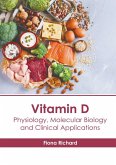Vitamins are organic molecules and essential micronutrients that are required by organisms in small quantities for appropriate functioning of their metabolism. Essential nutrients are usually not synthesized or if at all, are synthesized in insufficient quantities in the body of organisms. Therefore, organisms must obtain vitamins through proper diet. The majority of vitamins contain groups of related molecules known as vitamers. For instance, vitamin E has eight vitamers comprising four tocotrienols and four tocopherols. In humans, 13 vitamins are found. They are vitamins A, E, C, K, D, B1, B5, B9, B2, B12, B3, B7, and B9. The vitamins are classified as being either fat-soluble or water-soluble based on their solubility. Vitamins A, D, E, and K are fat-soluble vitamins, whereas all others are water-soluble. The fat soluble vitamins are absorbed by the body along with the fats. They are stored within the liver and the fatty tissue. This book explores the biochemistry and clinical applications of vitamins. Those in search of information to further their knowledge on fat soluble vitamins will be greatly assisted by it.








